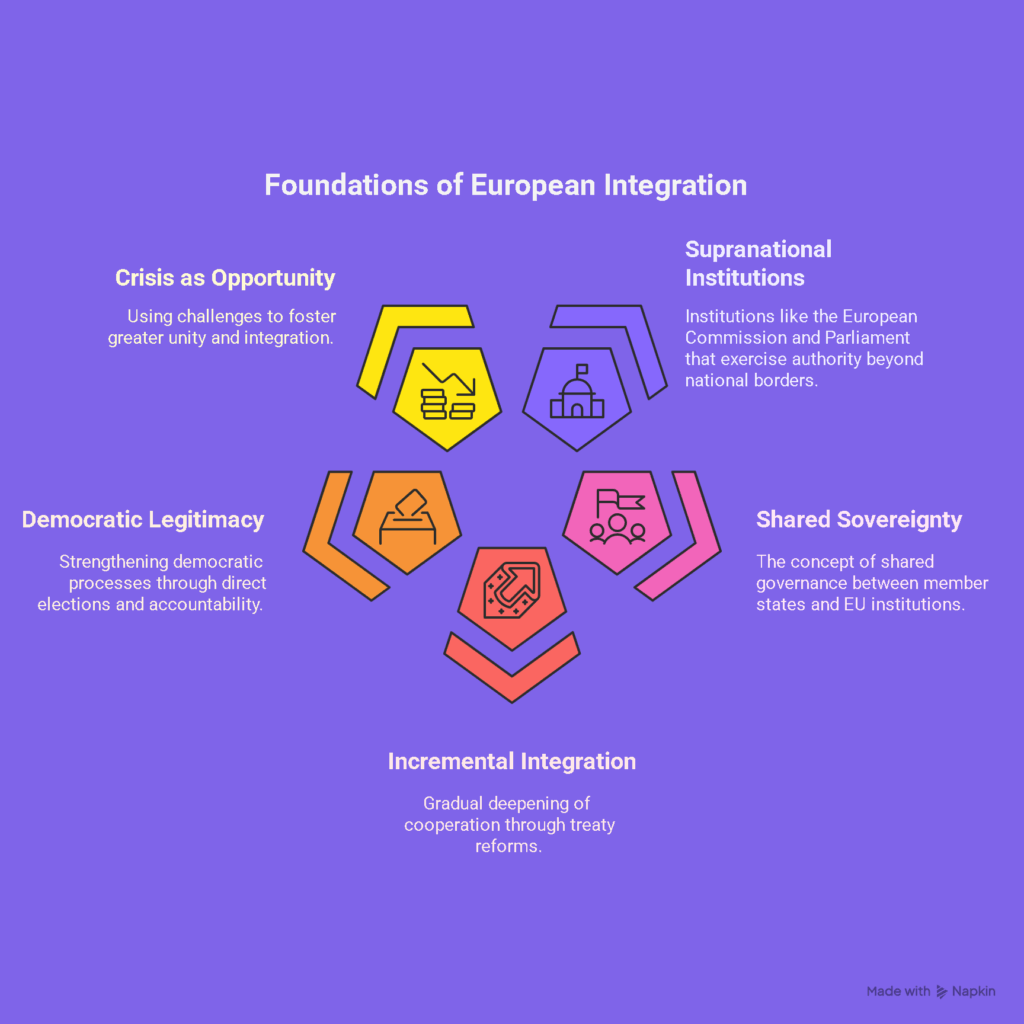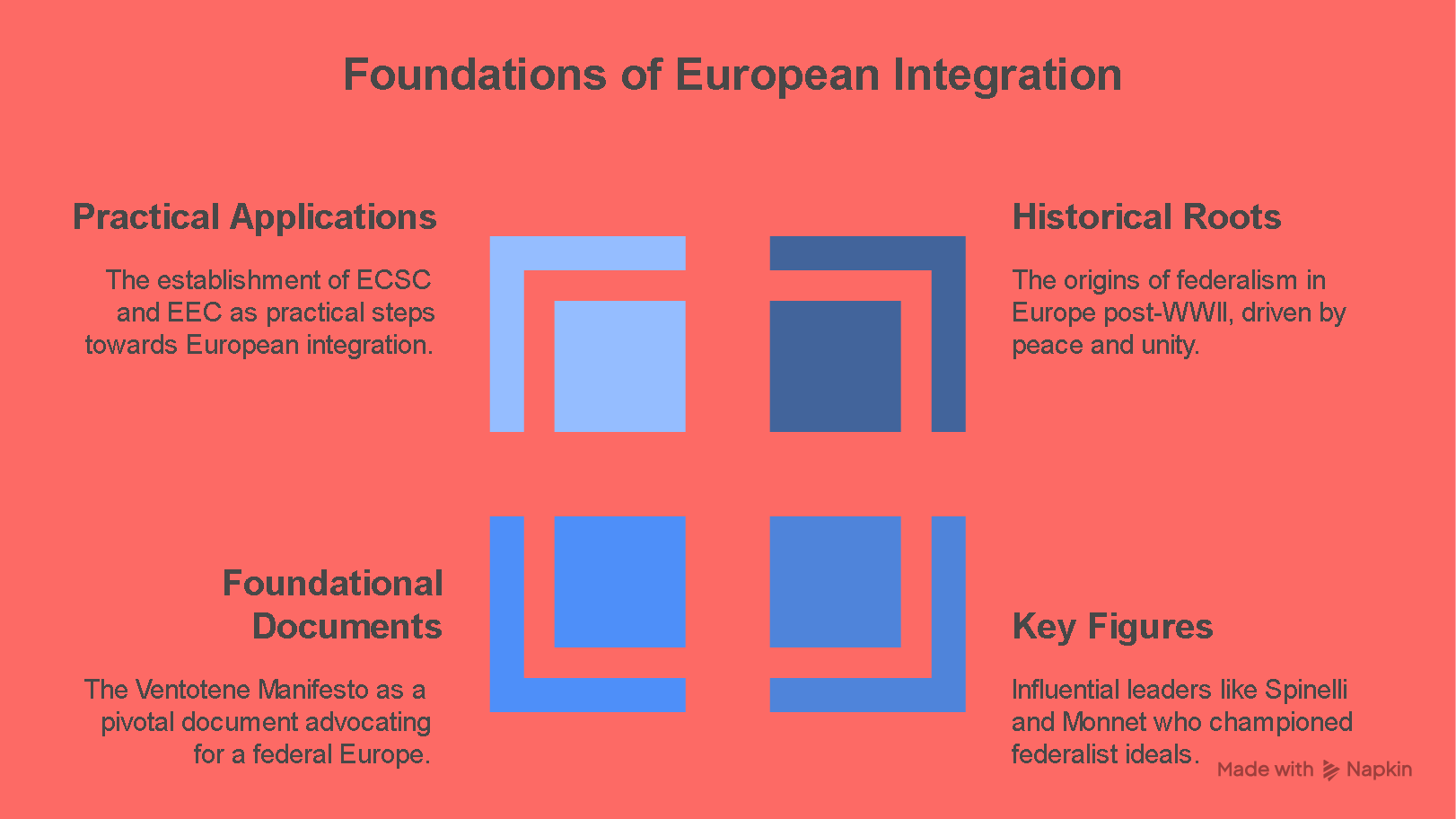integration. As a political philosophy that advocates the division of powers between a central authority and constituent political units (such as states or provinces), federalism offers a framework to manage unity and diversity simultaneously. In the context of Europe, the federalist approach has contributed significantly to conceptualizing and guiding the evolution of the European Union (EU), especially in its aim to balance national sovereignty with supranational governance.
Historical Background of Federalist Thought in Europe
The roots of federalism in Europe can be traced back to the aftermath of World War II. Intellectuals and political leaders, particularly those associated with the European Movement, such as Altiero Spinelli, Jean Monnet, and Robert Schuman, championed federalist ideals to prevent further wars and ensure peace through integration. The Ventotene Manifesto (1941), co-authored by Spinelli, is one of the earliest and most influential documents advocating for a federal Europe. It argued that only a federal structure, with pooled sovereignty, could prevent the recurrence of totalitarianism and conflict.
Federalism thus emerged not only as a theory but also as a practical strategy for peace and cooperation in post-war Europe. The creation of the European Coal and Steel Community (ECSC) in 1951 and later the European Economic Community (EEC) in 1957 were inspired by this federalist vision.
Core Contributions of Federalist Theory
- Supranational Institutions:
Federalist theory supports the establishment of institutions that exercise authority beyond the nation-state. The EU’s supranational bodies such as the European Commission, the European Parliament, and the Court of Justice of the European Union (CJEU) reflect federalist thinking. These institutions make decisions that are binding on member states, thus indicating a level of sovereignty transfer that federalism endorses. - Shared Sovereignty:
Federalism provides a theoretical justification for sharing sovereignty among different levels of governance. In the EU, sovereignty is shared between member states and EU institutions, especially in areas like trade, competition policy, and environmental regulations. This model allows for common decision-making while preserving national identities—a principle at the heart of federalist thought. - Incremental Integration:
Federalist theory has encouraged an incremental and pragmatic approach to integration, often referred to as functional federalism. Instead of pushing for a fully-fledged federal state from the beginning, European integration has evolved through gradual treaty reforms (e.g., Maastricht, Amsterdam, Nice, Lisbon), each step deepening cooperation and expanding competencies. - Democratic Legitimacy:
Federalists argue for the democratization of European governance. The increasing role of the European Parliament, which is directly elected by EU citizens, has strengthened the democratic legitimacy of the EU’s legislative process, aligning with federalist ideals of accountable and representative governance. - Crisis as Opportunity:
In federalist theory, crises are often seen as opportunities to advance integration. The EU’s response to challenges such as the Eurozone crisis, Brexit, and the COVID-19 pandemic (e.g., the Recovery and Resilience Facility) have demonstrated a tendency to deepen integration in times of stress—validating the federalist belief in unity through adversity.

Criticisms and Limitations
Despite its contributions, federalism has faced criticism in the European context. Many member states resist full federalization due to concerns about losing national sovereignty and cultural identity. Eurosceptic movements argue that federalism leads to a “democratic deficit,” where decisions are made by distant bureaucracies. Furthermore, the EU remains a sui generis entity—neither a federation like the USA nor a confederation. This has led scholars like Andrew Moravcsik to advocate intergovernmentalism as a more accurate explanation of EU integration, emphasizing state-driven cooperation over supranational authority.
Conclusion
Federalist theory has significantly influenced the vision, architecture, and evolution of the European Union. While the EU is not a federation in the classical sense, many of its features reflect federalist principles: shared sovereignty, supranational governance, and democratic participation. As the EU continues to face complex challenges, the federalist framework remains a vital lens through which to understand its potential future trajectory. As Jean Monnet aptly stated, “Europe will be forged in crises, and will be the sum of the solutions adopted for those crises.” This captures the essence of federalist contribution—seeking unity not through uniformity, but through collective, democratic, and resilient institutions.








Leave a Reply